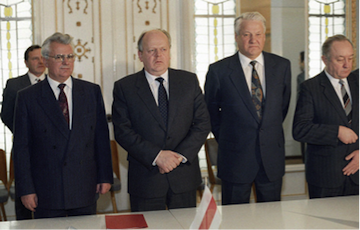

|
The August Coup and the Collapse of the Soviet regime  Kravchuk, Shushkevich, Yeltsin form the CIS The treaty would have converted the USSR into a federation of independent states, not unlike the European Union, with a single president, foreign president and military, and would have renamed it the Union of Soviet Sovereign Republics (with 'Sovereign' replacing 'Socialist'). The hardliners were determined to stop it. On 18 August a delegation of conspirators flew to Foros to demand the declaration of a state of emergency, and when Gorbachev refused their ultimatum, placed him under house arrest. In Moscow a self-appointed State Committee of the State of Emergency declared itself in power. It was made up, among others, of the Soviet Prime Minister, Valentin Pavlov; the KGB boss, Vladimir Kruchkov; the Defence Minister. Dmitry Yazov; and Boris Pugo, the Interior Minister. The putschists were too hesitant to have any real chance of success. They failed to arrest Yeltsin, who made his way to the White House, where he organized the defence of the Russian parliament by thousands of Muscovites. The coup soon collapsed. Its leaders were arrested. Gorbachev returned. But like Kerensky after the Kornilov plot, he found his own position had been undermined. The coup had discredited the Communist Party and handed the political initiative to Yeltsin as the 'defender of democracy'. On 23 August, the Russian parliament outlawed the Party in Russia. Six days later the CPSU was dissolved. Gorbachev wanted to revive the treaty talks but Yeltsin now turned against them, seeing the disbanding of the Soviet Union as a victory for Russia. Ukraine too was now opposed. On 8 December Yeltsin, Kravchuk and the Belorussian leader Stanislav Shushkevich met in Belarus to announce the dissolution of the Soviet Union. A Commonwealth of Independent States would take its place. In effect it was a coup by the three republican leaders to break away from the USSR and establish their own national governments. In a televised farewell address broadcast from the Kremlin on Christmas Day, Gorbachev declared that he could not support the abolition of the Soviet Union because it had not been ratified by constitutional procedures or by a democratic vote. Popular opinion had been in favour of a union. It was leaders and élites who had decided to end it. |
© 2014 Orlando Figes | All Rights Reserved